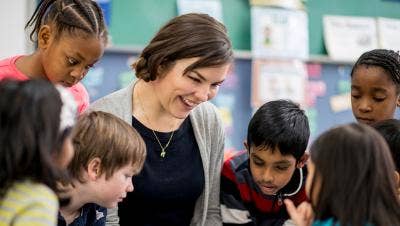- Benchmark Education
- Newmark Learning
- Reycraft Books
- Create an Account
Empowering Growth Mindsets Through Home-School Connections

By Rosanne Kurstedt, Ph.D.
In a society that promotes fixed mindsets, it is important to provide opportunities in which children understand and internalize that intelligence and talent are malleable—they can be developed. Since most adults grew up in a school system that categorized students as smart or not, it is up to teachers to re-educate caregivers about the idea that our brains can change and develop with effort and hard work. Even if we are stuck within a system of concrete grades that place a judgment on students’ knowledge or understanding, the narrative comments and the way teachers frame their comments to caregivers can markedly change the way caregivers perceive their own children.
Research has shown that caregivers’ beliefs about success and failure have a great deal to do with children’s mindsets. Therefore, when commenting on report cards or speaking with caregivers informally or during parent-teacher conferences, be sure to include growth mindset comments. Showing caregivers student work is a great way to guide them in seeing what students can do and what they know. Sharing and discussing various pieces of work that show progress can also be a great way to illustrate a growth mindset.
Teaching Parents or Guardians About Mindsets
Since so much of our society promotes a fixed mindset, educating caregivers about a growth mindset and helping them see how their language can impact their children’s understanding of themselves can only support teachers’ efforts in the classroom. A few ways to educate parents about the power of a growth mindset include:
- At back-to-school night or other gatherings, discuss the different mindsets and ways you will support a growth mindset in the classroom.
- Send home articles and information about perseverance, practice, and mistakes so parents have a sense of what you’re working toward in the classroom.
- Engage caregivers in book clubs about mindsets.
- Share videos and websites about the brain and how it grows when mistakes are made.
- Provide caregivers with scripts to talk about their child’s work.
Comments for Parents or Guardians
Effort/Resilience
- ___ (student) works hard when he/she doesn’t understand.
- ___ asks questions when he/she is faced with a challenge.
- ___ is working on taking a deep breath and using what he/she knows to solve a problem that is challenging.
- ___ is beginning to understand that we all make mistakes and that it is not only okay, but important for learning.
- While ___ has not mastered the material yet, he/she has made great progress and has continued to work hard.
- ___ understands that some things take time to learn and that having to do something again is part of learning.
- ___ used to shy away from challenges. Now your child seeks them out.
- ___ is beginning to understand that explaining his/her thinking not only deepens his/her learning, but also helps others.
- ___ knows that if one strategy doesn’t work, there are others to try.
- ___ is excited about math now, even though it is difficult, because your child knows that his/her brain is growing.
- ___ understands that with effort and perseverance, our brains grow connections. The different connections make us smarter.
- ___ knows that our brain is like a muscle, so for it to get strong, he/she needs to use it.
Autonomy
- ___ works on his/her own now. Your child tries a few things and works out some difficulties before he/she asks for help.
- ___ has developed a system for keeping his/her papers in order, which has really helped your child stay organized.
- ___ has taken it upon himself/herself to reorganize the system we use to borrow books from the library, and the library seems to be much more organized.
- ___ comes into school in the morning and is ready to learn. When he/she needs a break, he/she puts a slip of paper on my table and takes a walk around the classroom.
Reflection/Metacognition
- ___ reflects on his/her process and thinks deeply about how he/she can improve.
- ___ thinks about his/her thinking and often asks, “What if...?,” which helps him/her see things in new ways.
- It’s still difficult for ___ to explain his/her thinking, but he/she is working hard at it.
Collaboration
- ___ listens to other people’s ideas and then connects everyone’s thinking.
- ___ listens to others in his/her group and accepts when people have different opinions.
- ___ is making an effort to speak up more when working in groups.

















Comments